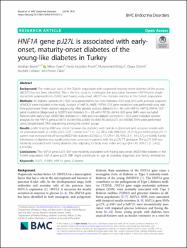| dc.contributor.author | Beysel, Selvihan | |
| dc.contributor.author | Eyerci, Nilnur | |
| dc.contributor.author | Alparslan Pınarlı, Ferda | |
| dc.contributor.author | Kızılgül, Muhammed | |
| dc.contributor.author | Özçelik, Özgür | |
| dc.contributor.author | Çalışkan, Mustafa | |
| dc.contributor.author | Çakal, Erman | |
| dc.date.accessioned | 2021-05-05T22:14:15Z | |
| dc.date.available | 2021-05-05T22:14:15Z | |
| dc.date.issued | 2019 | |
| dc.identifier.issn | 1472-6823 | |
| dc.identifier.uri | https://doi.org/10.1186/s12902-019-0375-2 | |
| dc.identifier.uri | https://hdl.handle.net/20.500.12933/393 | |
| dc.description | WOS:000468404000002 | en_US |
| dc.description | PubMed: 31109344 | en_US |
| dc.description.abstract | BackgroundThe molecular basis of the Turkish population with suspected maturity-onset diabetes of the young (MODY) has not been identified. This is the first study to investigate the association between HNF1A-gene single-nucleotide polymorphisms (SNPs) and having early-onset, MODY-like diabetes mellitus in the Turkish population.MethodsAll diabetic patients (N=565) who presented to our clinic between 2012 and 2015 with a clinical suspicion of MODY were included in the study. Analysis of HNF1A, HNFB, HNF4A, GCK gene mutations was performed using real-time polymerase chain reaction sequencing. After genetic analysis, diabetics (n=46) with HNF1A, HNF1B, HNF4A, GCK gene mutations (diagnosed as MODY) and diabetics (n=30) with HNF1B, HNF4A, GCK gene SNPs were excluded. Patients with early-onset, MODY-like diabetes (n=486) and non-diabetic controls (n=263) were included. Genetic analyses for the HNF1A gene p.S487N (rs2464196), p.A98V (rs1800574) and p.I27L (rs1169288) SNPs were performed using Sanger-based DNA sequencing among the control group.Resultsp.S487N and p.A98V was similar between the diabetics and controls in dominant and recessive models with no association (each, p>0.05). p.I27L GT/TT carriers (GT/TT vs. GG, OR=1.68, 95% CI: [1. 21-2.13]; p=0.035) and p.I27L TT carriers had increased risk of having MODY-like diabetes (GT/GG vs. TT, OR=1.56, 95% CI: [1. 14-2.57]; p=0.048). Family inheritance of diabetes was significantly more common in patients with the p.I27L TT genotype. The p.I27L SNP was modestly associated with having diabetes after adjusting for body mass index and age (=1.45, 95% CI: [1. 2-4.2]; p=0.036).ConclusionsThe HNF1A gene p.I27L SNP was modestly associated with having early-onset, MODY-like diabetes in the Turkish population. HNF1A gene p.I27L SNP might contribute to age at diabetes diagnosis and family inheritance. | en_US |
| dc.language.iso | eng | en_US |
| dc.publisher | Bmc | en_US |
| dc.rights | info:eu-repo/semantics/openAccess | en_US |
| dc.subject | P.I27L | en_US |
| dc.subject | P.A98V | en_US |
| dc.subject | HNF1A gene | en_US |
| dc.subject | Diabetes | en_US |
| dc.title | HNF1A gene p.I27L is associated with early-onset, maturity-onset diabetes of the young-like diabetes in Turkey | en_US |
| dc.type | article | en_US |
| dc.department | AFSÜ, Tıp Fakültesi, Dahili Tıp Bilimleri Bölümü, İç Hastalıkları Ana Bilim Dalı | en_US |
| dc.contributor.institutionauthor | Beysel, Selvihan | |
| dc.identifier.doi | 10.1186/s12902-019-0375-2 | |
| dc.identifier.volume | 19 | en_US |
| dc.relation.journal | Bmc Endocrine Disorders | en_US |
| dc.relation.publicationcategory | Makale - Uluslararası Hakemli Dergi - Kurum Öğretim Elemanı | en_US |
















